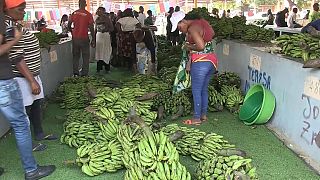Angola
Huila Province, Southern Angola. Months of no rain have sucked life out of the vast region and brought communities to near starvation.
People have to trek several kilometers to find water or fruits, for which they have to compete with wildlife.
Angola's government recently started building three water projects in the provinces of Cunene and Huila. The water ministry said the dams will significantly reduce the impact of the drought in the affected regions.
"We are creating a water reserve to meet the needs of the population, of livestock, and of agricultural activity, more specifically irrigation," said Manuel Quintino, the director-general of the National Institute of Water Resources of the Ministry of Energy and Water.
The projects valued at $630 million rest on the diversion of the flow of major rivers. But environmentalists have voiced concerns about possible damage to fragile ecosystems which they say could aggravate climate change.
"These river diversion solutions can alter entire ecosystems. Therefore it is necessary that there are very sensitive evaluations about what changes could be caused by the diversion of rivers. Not only at the level of populations, species that live in the rivers themselves," noted Érica Tavares, an environmental biologist, and activist.
Cunene and Huila provinces are some of Angola's poorest and prone to adverse weather conditions.
According to the World Food Programme, the lack of rain between November 2020 and January 2021 has resulted in the worst drought in 40 years.










01:26
Zimbabwe’s Climate-Smart Agriculture: Empowering Farmers through Resilience and Innovation
01:06
Cholera fears as Sudan faces a worsening water crisis
01:26
UN: Southern Africa faces worst hunger crisis in decades due to El Niño
Go to video
Biden postpones trip to Germany and Angola to monitor Hurricane Milton
01:36
World's rivers experience driest year in over 3 decades
01:03
Biden to travel to Angola next month, making his first trip to Africa as U.S. President